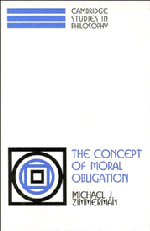Book contents
- Frontmatter
- Contents
- Preface
- Acknowledgments
- 1 Groundwork: Some distinctions
- 2 Moral obligation: An analysis
- 3 The dynamics of obligation
- 4 Conditional obligation
- 5 Prima facie obligation
- 6 Actualism and possibilism
- 7 Dilemmas
- 8 Supererogation
- 9 Cooperation
- Postscript
- Appendix: List of propositions
- List of works cited
- Index of names
- Index of subjects
7 - Dilemmas
Published online by Cambridge University Press: 18 February 2010
- Frontmatter
- Contents
- Preface
- Acknowledgments
- 1 Groundwork: Some distinctions
- 2 Moral obligation: An analysis
- 3 The dynamics of obligation
- 4 Conditional obligation
- 5 Prima facie obligation
- 6 Actualism and possibilism
- 7 Dilemmas
- 8 Supererogation
- 9 Cooperation
- Postscript
- Appendix: List of propositions
- List of works cited
- Index of names
- Index of subjects
Summary
THE NATURE OF MORAL DILEMMAS
The aloofness of the metaethicist may seem particularly objectionable when the subject is moral dilemmas. A dispassionate inquiry into moral dilemmas may appear especially inappropriate – their very nature demands a passionate response – and those metaethicists who deny that such dilemmas can even arise may seem to have reserved for themselves a unique place among out-of-touch academics.
To which I reply (as politely as possible): the criticism is misdirected. No one is denying that life can present people with choices that are excruciating, both morally and personally. No one is denying that anyone who is confronted with such a choice, whether as participant or simply as spectator, should be deeply moved by it. The question is: just what is at stake in such choices? What is the nature of the situation in which such choices arise? To shun such inquiry is to court confusion, and that is what is objectionable.
Moral dilemmas, as typically construed, are conflicts of moral obligation, but not all conflicts of obligation are dilemmas. A conflict of obligation involves there being two or more obligations which cannot all be satisfied, although each can be. In earlier chapters I have distinguished two main species of moral obligation–overall obligation and prima facie obligation – and from this emerge three main types of conflict: overall versus overall, overall versus prima facie, and prima facie versus prima facie. Let us consider the last type of conflict first.
- Type
- Chapter
- Information
- The Concept of Moral Obligation , pp. 207 - 231Publisher: Cambridge University PressPrint publication year: 1996



